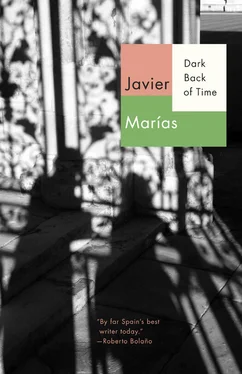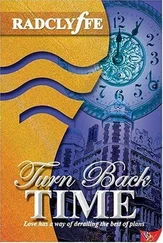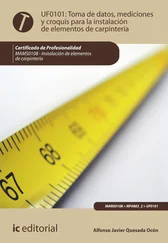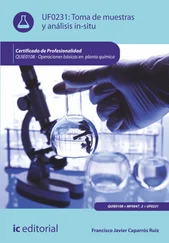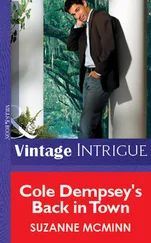I climbed to the top of the ladder and stood there a moment, looking down at Mr. and Mrs. Stone from above, as if they were my subjects; they, for their part, had not returned to their duties but were observing me in great expectation, as if they thought a failure to hang on to my every movement and step would be a slight or insult to me during my visit in these new times and therefore had decided to observe or accompany me with their gaze in my quests. I ran my eyes and swift fingers over the top shelf and immediately found a volume I’d been seeking for some time to give to my friend Manolo Rodríguez Rivero, who, for his many escapades, is in no way deserving of such a gift, but who had envied my own copy more than once on seeing it in my house; I often have it out because it’s the kind of book you read bit by bit and in episodes: A General History of the Pyrates , by Daniel Defoe, in its infrequent complete version, an immense tome, more than seven hundred pages long. I was casually hefting the General History of the Pyrates when Mrs. Stone began to talk about the film of my novel that was then being planned by the imposing businessman Elías Querejeta, to be directed by his daughter, whose name, naturally, was Querejeta as well, but not Elias.
“Mr. Roger Dobson told us there’s going to be a film based on All Souls ” she said, to my great surprise, this time beating her husband to it. “Is it true? Will it be filmed on location here in Oxford? Have they picked the locations yet? Have they chosen the cast?”
I had been given little information about the project, still very incipient at that point, though I couldn’t have imagined then that Querejeta and Querejeta’s discourtesy and inconsiderateness would be so extreme that they would inform me of almost nothing — despite what the contract set forth — even when the film was well underway, and would endeavour not to show me the footage once it was finished, hiding it from me as long as they could while it was being seen at private screenings by all their pet critics and friends and acolytes, as I learned from other people. I had had my doubts about giving my permission to their project and granting them the film rights, among other reasons because I didn’t see how a film could easily or successfully be derived from that novel or any other I’ve written, except the first, which I wrote when I was nineteen and may still be my best. It also made me a little wary when, in a lunch prior to the agreement, Querejeta and Querejeta cheerfully expressed the pathetic idea that the characters of Toby Rylands and Cromer-Blake had been lovers, merely because the book said Cromer-Blake was homosexual and didn’t make clear what Rylands was, sexually speaking. “What?” I had answered. “There’s not the least hint or suggestion of that. It’s a relationship of master to disciple, elder to younger, a father-son relationship, in no way are they lovers or ex-lovers, what nonsense.” The fact that they had arrived at this banal idea suggested a failure to understand a word of the book, perhaps even the obtuse reading of a purely commercial mind which, to make matters worse, doesn’t believe itself to be any such thing. The imperious businessman persisted, asking a question that was outstanding in its genre and gave an idea of his immeasurable respect for writers and his equally impressive acuity. “Are you sure?” he said, gazing at me intensely as if by that means to convince me of my error. Given that he was going to write the screenplay with the other Querejeta, I should have thought it over a little more. I could have been sarcastic but refrained, after all they were being kind then to take an interest in my novel and very blandishing in their attempts to persuade me to accept their offer. So I limited myself to the obvious answer: “How could I not be sure? After all, this is a novel and I wrote it, and I’m not the sort of writer who leaves everything to the reader’s intuition.” Naively, I heaved a sigh of relief, believing I had nipped a serious misunderstanding in the bud. I need hardly say that in the film that was finally made and premiered four years later in 1996, Rylands and Cromer-Blake, poor men, had been transformed into two unlikely and rather unlikable and shrill ex-lovers, supposedly impassioned ex-lovers according to what we were continually being told but never saw in the images, who had nothing at all to do with the characters in the novel apart from their family names and Cromer-Blake’s illness: in fact, “Robert Rylands”—he no longer bore his very proper upper-class British name because, as Querejeta the director confessed in writing, she had once had a dog named Toby, a weighty artistic scruple indeed — struck me as an unbearable and odious individual, what you might call a drip, the mere sight of whom was enough to make anyone flee the room. There had never been any misunderstanding, it was something else, and if there was an initial misunderstanding it mattered very little to the father-daughter duo that the author had rejected it from the first moment: the author is insignificant. But when Mrs. Stone asked me about it in the summer of 1993, there wasn’t yet any screenplay, there was barely even a project, and I still had my naive good faith in both Querejetas, though always more in one particular Querejeta, to whom I believe I listened quite a bit when asked to do so and in whom I then felt very disappointed, for that reason.
“No, I don’t think they’ve chosen the locations or thought about the cast yet,” I answered from my high vantage point, the General History of the Pyrates casually in hand. I was looking at the price, £40, a little expensive, I wondered if I liked Manolo R. R. that much. “But yes, it’s true that a film is going to be made, and I know they plan to shoot it in Oxford.”
Mr. Stone put a single hand to his cheek and I saw his eyes light up with a suggestive gleam as he raised them towards the ceiling.
“And will it be quite faithful to the novel?” Mrs. Stone went on, “or will it only use the parts that are more, more sentimental?”
“Do you mean more sexual?” I answered: speaking from on high confers daring and a sense of impunity, as despots, bankers, businessmen, judges and tyrants have always known. The Stones had read the novel, then, someone else’s copy, perhaps even Roger Dobson’s. “No, I hope not, I don’t think so, but I doubt they’ll be very faithful, and of course parts of the book will be left out completely. As you know, the cinema is very rich in some ways, very limited in others.”
Mr. Stone broke in then, in a tone both eager and apologetic. “Gillian was asking, Mr. Márias”—both of them pronounced my surname wrong, making it rhyme with “arias”—“because if they happen to need actors to play the booksellers in the novel, you know, that couple, the Alabasters, well, we’d be able to do it with great pleasure, I think we’d be right for the part, don’t you agree?” He paused for a moment, he was speaking timidly yet vehemently, as if it truly mattered a great deal to him. “Did you know? In my younger days I had considerable experience on the stage, and recently I’ve gone back to it, I played a small part in an independent dramatic production, that’s what they call them, at the last Edinburgh Festival, my son was involved in putting it on and asked me to lend a hand. Great fun. We are also members of the OSCA”—“the O.S.C.A.,” he said each letter separately—“and we’ve appeared in a few films that were shot here, The Madness of King George —ahem — was the most recent. Roger Dobson and Rupert Cook are also members. Acting is marvelous. So, if they consult you on the casting, don’t forget us, we’d be delighted to participate. Though we’ve already written to the Spanish producer, something like Elijah … Er, well, I’m incapable of pronouncing it, something with Q and the word ‘reject’ in it, isn’t that right, love?”—he asked his wife, who nodded—“which certainly isn’t very promising, for our hope that they won’t reject us, I mean, by offering us the parts that are so perfect for us. But we’ve had no answer at all, and we even wrote on stationery with the OSCA logo, if I remember aright. Is it normal in Spain not to answer letters?”
Читать дальше
